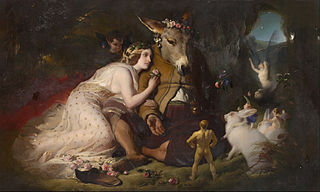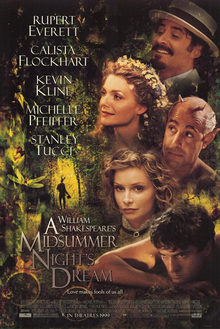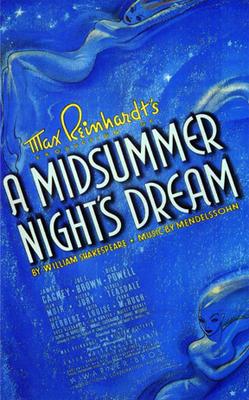Related Research Articles

A Midsummer Night's Dream is a comedy play written by William Shakespeare in about 1595 or 1596. The play is set in Athens, and consists of several subplots that revolve around the marriage of Theseus and Hippolyta. One subplot involves a conflict among four Athenian lovers. Another follows a group of six amateur actors rehearsing the play which they are to perform before the wedding. Both groups find themselves in a forest inhabited by fairies who manipulate the humans and are engaged in their own domestic intrigue. A Midsummer Night’s Dream is considered one of Shakespeare's most popular and widely performed plays.

Puck, or Robin Goodfellow, is a character in William Shakespeare's play, A Midsummer Night's Dream.

The mechanicals are six characters in A Midsummer Night's Dream who perform the play-within-a-play Pyramus and Thisbe. They are a group of amateur and mostly incompetent actors from around Athens, looking to make names for themselves by having their production chosen among several acts as the courtly entertainment for the royal wedding party of Theseus and Hippolyta. The servant-spirit Puck describes them as "rude mechanicals" in Act III, Scene 2 of the play, in reference to their occupations as skilled manual laborers.

William Kempe, commonly referred to as Will Kemp, was an English actor and dancer specialising in comic roles and best known for having been one of the original stage actors in early dramas by William Shakespeare. Roles associated with his name may include the great comic creation Falstaff and his contemporaries considered him the successor to the great clown of the previous generation, Richard Tarlton.
The Lord Chamberlain's Men was a company of actors, or a "playing company", for which William Shakespeare wrote during most of his career. Richard Burbage played most of the lead roles, including Hamlet, Othello, King Lear, and Macbeth. Formed at the end of a period of flux in the theatrical world of London, it had become, by 1603, one of the two leading companies of the city and was subsequently patronized by James I.

Nick Bottom is a character in Shakespeare's A Midsummer Night's Dream who provides comic relief throughout the play. A weaver by trade, he is famously known for getting his head transformed into that of a donkey by the elusive Puck. Bottom and Puck are the only two characters who converse with and progress the three central stories in the whole play. Puck is first introduced in the fairies' story and creates the drama of the lovers' story by messing up who loves whom, and places the donkey head on Bottom's in his story. Similarly, Bottom is performing in a play in his story intending it to be presented in the lovers' story, as well as interacting with Titania in the fairies' story.

Snug is a minor character from William Shakespeare's play A Midsummer Night's Dream. He is a joiner who comes from Athens who is hired by Peter Quince to play the part of the lion in Pyramus and Thisbe. When he is first assigned the part, he is afraid it may take him a while to finally remember his lines. Bottom offers to play the part of the lion, but he is rejected by Quince, who worries that his loud and ferocious roar in the play will frighten the ladies of power in the audience and get Quince and all his actors hanged. In the end, the lion's part is revised to explain that he is in fact not a lion and means the audience no harm.

Titania is a character in William Shakespeare's 1595–1596 play A Midsummer Night's Dream.

Tom Snout is a character in William Shakespeare's A Midsummer Night's Dream. He is a tinker, and one of the "mechanicals" of Athens, amateur players in Pyramus and Thisbe, a play within the play.

Shakespeare's plays are a canon of approximately 39 dramatic works written by English poet, playwright, and actor William Shakespeare. The exact number of plays as well as their classifications as tragedy, history, comedy, or otherwise is a matter of scholarly debate. Shakespeare's plays are widely regarded as among the greatest in the English language and are continually performed around the world. The plays have been translated into every major living language.

Francis Flute is a character in William Shakespeare's A Midsummer Night's Dream. His occupation is a bellows-mender. He is forced to play the female role of Thisbe in "Pyramus and Thisbe", a play-within-the-play which is performed for Theseus' marriage celebration.

Robin Starveling is a character in William Shakespeare's A Midsummer Night's Dream (1596), one of the Rude Mechanicals of Athens who plays the part of Moonshine in their performance of Pyramus and Thisbe. His part is often considered one of the more humorous in the play, as he uses a lantern in a failed attempt to portray Moonshine and is wittily derided by his audience.

A Midsummer Night's Dream is a 1968 British film of William Shakespeare's play A Midsummer Night's Dream, directed by Peter Hall.

A Midsummer Night's Dream is a 1999 fantasy romantic comedy film written, directed and co-produced by Michael Hoffman, based on the 1600 play of the same name by William Shakespeare. The ensemble cast features Kevin Kline as Bottom, Michelle Pfeiffer and Rupert Everett as Titania and Oberon, Stanley Tucci as Puck, and Calista Flockhart, Anna Friel, Christian Bale, and Dominic West as the four lovers.

A Midsummer Night's Dream is a 1935 American romantic comedy fantasy film of William Shakespeare's play, directed by Max Reinhardt and William Dieterle, and starring James Cagney, Mickey Rooney, Olivia de Havilland, Jean Muir, Joe E. Brown, Dick Powell, Ross Alexander, Anita Louise, Victor Jory and Ian Hunter. Produced by Henry Blanke and Hal B. Wallis for Warner Brothers, and adapted by Charles Kenyon and Mary C. McCall Jr. from Reinhardt's Hollywood Bowl production of the previous year, the film is about the events surrounding the marriage of the Duke of Athens, Theseus, and the Queen of the Amazons, Hippolyta. These include the adventures of four young Athenian lovers and a group of six amateur actors, who are controlled and manipulated by the fairies who inhabit the forest in which most of the story is set. The play, which is categorized as a comedy, is one of Shakespeare's most popular works for the stage and is widely performed across the world. Felix Mendelssohn's music was extensively used, as re-orchestrated by Erich Wolfgang Korngold. The ballet sequences featuring the fairies were choreographed by Ballets Russes veteran Bronislava Nijinska.
"Peter Quince at the Clavier" is a poem from Wallace Stevens's first book of poetry, Harmonium. The poem was first published in 1915 in the "little magazine" Others: A Magazine of the New Verse, edited by Alfred Kreymborg.

A Midsummer Night's Dream is a 1909 American film directed by Charles Kent and J. Stuart Blackton, and starring Walter Ackerman and Charles Chapman. It was the first film adaptation of the eponymous play by William Shakespeare. The movie was made during summer 1909, but not released until December 25.
David Meyer is an English actor. He is the twin of Anthony Meyer who has often appeared alongside him in film. He is best known for his role as a knife-throwing circus performer and assassin in the 1983 James Bond film Octopussy, for Shakespearean roles such as Hamlet and Ferdinand, and for portraying Isaac Newton on stage. Meyer, as part of Shakespeare's Globe, has appeared in numerous productions on stage in London in recent decades, and in 2017 played Saturn in James Wallace's production of The Woman in the Moon at the Sam Wanamaker Playhouse.

The 1970 Royal Shakespeare Company (RSC) production of A Midsummer Night's Dream was directed by Peter Brook, and is often known simply as Peter Brook'sDream. It opened in the Royal Shakespeare Theatre at Stratford-upon-Avon and then moved to the Aldwych Theatre in London's West End in 1971. It was taken on a world tour in 1972–1973. Brook's production of A Midsummer Night's Dream for the RSC is often described as one of the 20th century's most influential productions of Shakespeare, as it rejected many traditional ideas about the staging of classic drama.
Midsummer Mechanicals is a 2022 play written by Kerry Frampton and Ben Hales. The story, a sequel to William Shakespeare's A Midsummer Night's Dream, follows the titular troupe of actors, The Mechanicals, attempting to put on a new play at the court of Duke Theseus. The work is aimed towards families and children aged 5-12, making this the first full-scale family-oriented production put on by Shakespeare's Globe.
References
- ↑ Montrose 1996, p. 185.
- ↑ Wells 1990, pp. 60–63.
- ↑ Leach 2008, p. 119.
- ↑ Bates 1985, p. 117.
- ↑ Morganti, Emily (2019-10-25). "Elsinore review". Adventure Gamers. Archived from the original on 2020-02-01. Retrieved 2020-04-18.